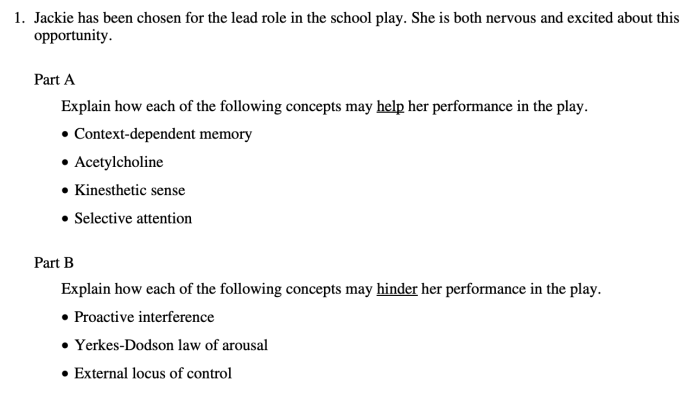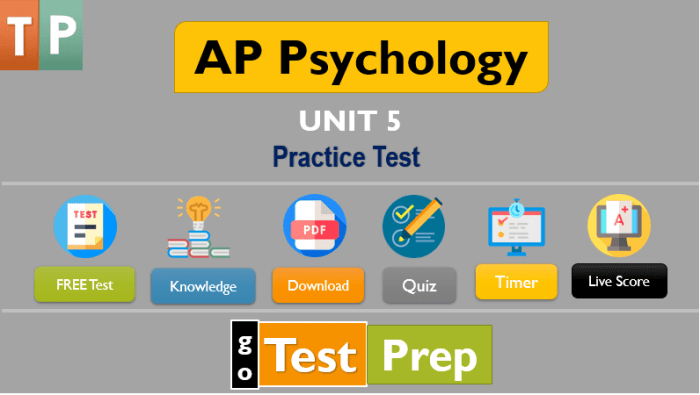Unit 6 AP Psychology Practice Test: A Comprehensive Guide to Success introduces students to the essential concepts and question types they will encounter on the actual AP Psychology exam. This practice test provides an invaluable opportunity for students to assess their understanding of the material, identify areas for improvement, and build confidence in their test-taking abilities.
The practice test covers the key concepts and topics Artikeld in Unit 6 of the AP Psychology curriculum, including social psychology, personality, and abnormal psychology. It features a variety of question types, including multiple choice, short answer, and essay questions, designed to mirror the format and difficulty level of the actual exam.
Unit 6 AP Psychology Practice Test Overview

The Unit 6 AP Psychology Practice Test is a valuable resource designed to help students prepare for the Advanced Placement Psychology Exam. It provides an opportunity for students to assess their understanding of the key concepts and topics covered in Unit 6 of the AP Psychology curriculum.
The practice test is intended for students who have completed or are currently enrolled in an AP Psychology course. It is structured similarly to the actual AP Psychology Exam, consisting of both multiple-choice and free-response questions.
The practice test has a time limit of 60 minutes, reflecting the time constraints of the actual exam. It is recommended that students take the practice test under timed conditions to simulate the testing experience.
Content Covered in the Practice Test
The Unit 6 AP Psychology Practice Test covers a range of key concepts and topics from the AP Psychology curriculum, including:
- Developmental Psychology
- Cognitive Development
- Social Development
- Moral Development
- Attachment and Relationships
- Language Development
- Personality Development
- Psychopathology
- Treatment of Psychological Disorders
The relative importance of different topics is reflected in the weighting of questions on the practice test. For example, Developmental Psychology and Cognitive Development receive a greater emphasis than other topics.
Question Types and Difficulty Level
The Unit 6 AP Psychology Practice Test includes a variety of question types, including:
- Multiple-choice questions (50% of the test)
- Short-answer questions (25% of the test)
- Essay questions (25% of the test)
The difficulty level of the questions varies, with some questions being more straightforward and others requiring more in-depth analysis and synthesis of information.
The multiple-choice questions assess students’ basic knowledge and understanding of key concepts. The short-answer questions require students to provide concise, specific answers to questions that typically focus on a single topic or issue.
The essay questions are more complex and require students to demonstrate their ability to integrate and synthesize information from multiple sources, as well as to present their own ideas and perspectives.
Test-Taking Strategies and Time Management
To maximize their performance on the Unit 6 AP Psychology Practice Test, students should employ effective test-taking strategies and time management techniques.
For multiple-choice questions, it is important to read the question carefully and eliminate obviously incorrect answer choices before selecting an answer.
For short-answer questions, students should focus on providing concise, specific answers that directly address the question.
For essay questions, students should allocate their time wisely, ensuring that they spend sufficient time planning, writing, and proofreading their responses.
Scoring and Interpretation
The Unit 6 AP Psychology Practice Test is scored using a rubric that evaluates students’ performance on each question type.
Multiple-choice questions are worth one point each, while short-answer questions are worth two points each. Essay questions are worth four points each.
Students should use their scores to identify areas of strength and weakness in their understanding of the material. This information can be used to develop a study plan that focuses on addressing specific areas of need.
Benefits of Taking the Practice Test

Taking the Unit 6 AP Psychology Practice Test provides several benefits for students, including:
- Identifying strengths and weaknesses in their understanding of the material
- Becoming familiar with the format and structure of the actual AP Psychology Exam
- Building confidence and reducing test anxiety
- Developing effective test-taking strategies and time management techniques
By taking the practice test and using the results to guide their preparation, students can significantly improve their chances of success on the actual AP Psychology Exam.
Top FAQs: Unit 6 Ap Psychology Practice Test
What is the purpose of the Unit 6 AP Psychology Practice Test?
The Unit 6 AP Psychology Practice Test is designed to help students assess their understanding of the material covered in Unit 6 of the AP Psychology curriculum and identify areas for improvement.
What types of questions are included on the practice test?
The practice test includes a variety of question types, including multiple choice, short answer, and essay questions, which are designed to mirror the format and difficulty level of the actual AP Psychology exam.
How can I use the practice test to prepare for the actual exam?
To use the practice test effectively, students should take the test under timed conditions, review their answers, and identify areas where they need additional support. Students can then focus their studying on these areas to improve their understanding and performance on the actual exam.